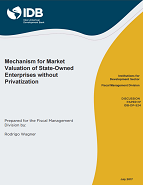Mechanism for Market Valuation of State-Owned Enterprises without Privatization
Date
Jul 2017
State-owned enterprises (SOEs), including state-owned banks, can be both systemically and politically important for many economies. While many of these firms have been privatized in recent decades, for various political or practical reasons many are likely to remain 100 percent state-owned, which prevents them from obtaining a market-based valuation. Having a market signal for the value of SOEs could be desirable because it could help: (i) inform the treasury of the net present value (NPV) of expected cash flows; (ii) impose some discipline on management; (iii) signal changes in capture by entrenched groups; and (iv) value discoveries and R&D that are slow to show up in cash flows. This paper presents a novel mechanism to create a market value for SOEs that cannot have publicly traded equity. It is based on the idea that parties, potentially independent from the SOE, can trade contingent financial claims for the future cash flows that an SOE pays to the government. Technically, it is a set of Arrow-Debreu securities that can mimic the SOE’s cash flows. The document discusses various ways to implement this principle, as well as the potential challenges and some answers to these challenges. Preliminary calculations show that issuing claims equivalent to 5 to 10 percent of salient Latin American SOEs could be sizeable to get analyst coverage and liquidity, without compromising state ownership of assets and decisions.



